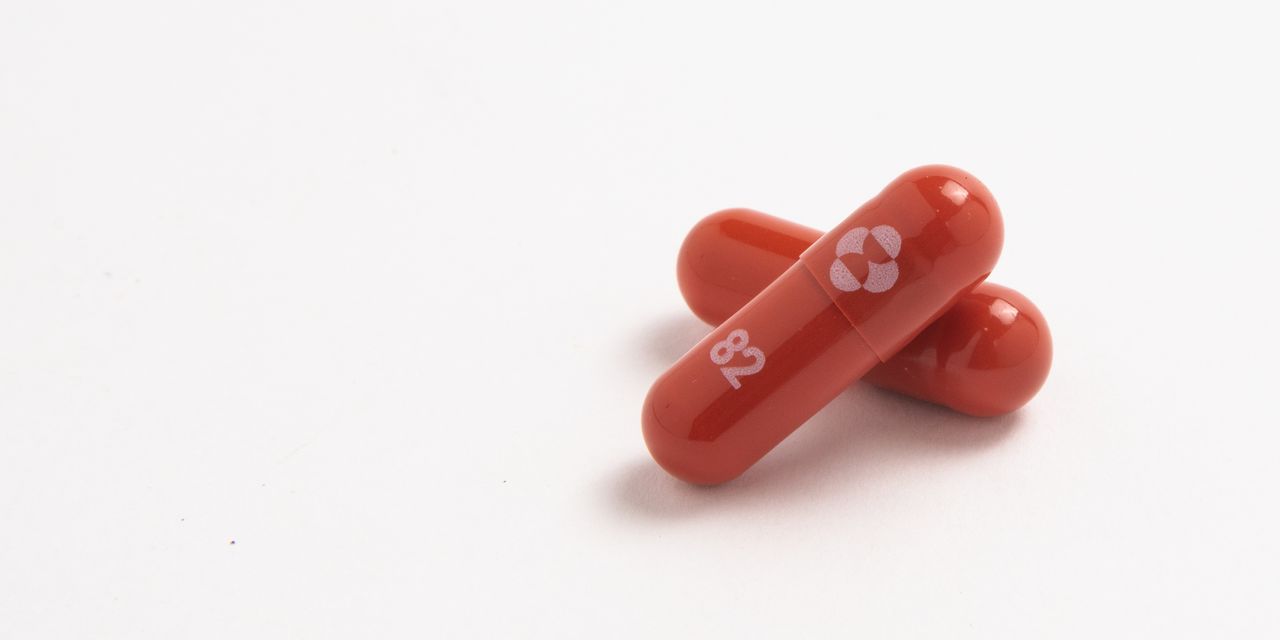
Merck & Co. and partner Ridgeback Biotherapeutics LP said Monday they have filed an application asking U.S. health regulators to authorize their Covid-19 pill, the next step toward adding a long-sought drug for use at home.
The filing comes shortly after data from a late-stage study showed that the antiviral drug, molnupiravir, cut the risk of hospitalization or death by about 50% in high-risk people with mild to moderate Covid-19.
The U.S. Food and Drug Administration could clear the antiviral in the coming weeks and possibly in time for what some public-health experts say could be another virulent winter, especially among people who aren’t vaccinated.
“The extraordinary impact of this pandemic demands that we move with unprecedented urgency, and that is what our teams have done by submitting this application for molnupiravir to the FDA within 10 days of receiving the data,” Merck Chief Executive Robert Davis said.
Unlike Covid-19 vaccines and some other drugs for the disease that target the spike protein, molnupiravir works by targeting a part of the virus that helps it reproduce.
Doctors and patients have been waiting for an effective pill that would be easy to take at home, with the goal of preventing a case from turning severe and requiring hospitalization.
Antibody drugs, like one from Regeneron Pharmaceuticals Inc., have been authorized for use in Covid-19 patients before they are hospitalized. These drugs have shown to be more effective in clinical trials, but they require infusions and are tougher to administer.
The Merck-Ridgeback pill, if authorized, would be the first oral antiviral for Covid-19. A course of treatment is 40 pills, eight daily for five days, started within five days of showing symptoms.
The companies have said that the rate of side effects in study subjects who got molnupiravir and those who got a placebo was similar.
The findings were based on an early look at the data from a pivotal trial that is scheduled to finish in November.
Merck plans to manufacture 10 million courses of treatment by the end of the year and has already begun production. The Kenilworth, N.J.-based drugmaker has a $1.2 billion deal with the U.S. to provide 1.7 million courses of treatment, should regulators clear it for use.
Merck also has said it would make molnupiravir available globally and has licensing agreements with generic drugmakers, including Dr. Reddy’s Laboratories Ltd. and Sun Pharmaceutical Industries Ltd. , to ensure the drug’s availability to low-income countries.
The company also said it plans to peg pricing for molnupiravir to the wealth of the country buying it, based on World Bank criteria, to help expand access to low- and middle-income countries.
Remdesivir, from Gilead Sciences Inc., is the only FDA-approved antiviral but its use is restricted to hospitalized patients.
The companies announced molnupiravir’s positive results this month after an early look at the data found that it helped unvaccinated people who were at high risk of becoming sick. High risk was defined as having at least one characteristic associated with severe disease or death, such as old age, obesity or diabetes.
The emergency-use authorization requested by Merck and Ridgeback is different from a full approval, permitting manufacturers to distribute products during public-health emergencies based on the best available evidence at the time.
Ridgeback licensed molnupiravir from a not-for-profit biotech company owned by Emory University and last year joined with Merck on its development.
Other drugmakers are working on Covid-19 antivirals, including Roche Holding AG and partner Atea Pharmaceuticals Inc., as well as Pfizer Inc., though they haven’t yet announced any results from late-stage studies.
Write to Jared S. Hopkins at [email protected]
Copyright ©2021 Dow Jones & Company, Inc. All Rights Reserved. 87990cbe856818d5eddac44c7b1cdeb8








